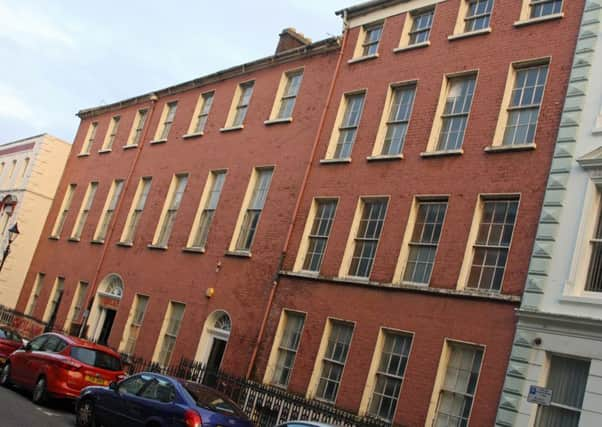Women and children still at core of Foyle Women's Aid after 40 years


Ironically, at a point when the city centre was considered a flashpoint and a no-go area, the women who came for shelter were safer behind the doors of 24 Pump Street than they were in the violent homes they had fled.
That was 40 years ago, at a point when rape within marriage wasn’t a crime, and by and large domestic incidents were seen as just that - not criminal offences.
Advertisement
Hide AdAdvertisement
Hide AdFast forward to 2016 and attitudes to domestic abuse are a world away from what they once were.


One of the organisations who have championed that change in attitude is Foyle Women’s Aid, who are currently marking 40 years in the city.
Foyle Women’s Aid Director, Marie Brown, is currently lobbying ministers here in order to secure the final 20 per cent of funding needed for ‘One Safe Place’ a family justice centre in the former convent on Pump Street. The service will be based on a highly successful international model, which, Marie says, will mean each victim is protected and that the process of reporting abuse is less traumatic for the individual.
“Compared to 40 years ago, there are now lots of services in place. For us, what’s important is how those services interact with one another. We’ve long identified the need for more than inter-agency communication and we’re advocating much closer collaboration between the services.
Advertisement
Hide AdAdvertisement
Hide Ad“Agencies will work together but each agency will retain its own identity. There are now a plethora of organisations and we’ve discovered that each woman has to relate her abuse story roughly 47 times.


Victims who have already been through so much have to go through it again and again and that essentially means that they are reliving the abuse so many times, being re-traumatised in the process. At ‘One Safe Place’ she will tell it just once. An important aspect of One Safe Place is that it is for all victims of abuse, because domestic and sexual abuse affects entire families, not only individuals.”
Greater awareness around domestic abuse - in all its forms - have also led to changes in the work carried out by charities like Foyle Women’s Aid.
“Forty years ago, the focus was very much on physical violence but gradually, as peoples’ awareness has grown over the years there’s now a wider focus on issues like psychological abuse, verbal abuse, sexual abuse and financial abuse as well as abuse involving children,” says Marie.
Advertisement
Hide AdAdvertisement
Hide Ad“What we’ve found is that there’s greater recognition of coercive control. So much about how domestic abuse is regarded has changed since 1976. For example, rape within marriage wasn’t considered a crime then.”
The impact of abuse is now recognised as so severe and widespread that Women’s Aid are faced with many other issues alongside the abuse itself. There are issues around homelessness, poverty, alcohol and drug addiction, and mental health issues like depression, anxiety, paranoia and flashbacks.
Tackling these issues, together with other specialist agencies, is a critical part of the work which is carried out by the group on a daily basis.
In reflecting on how the organisation has evolved alongside bigger shifts in how society views domestic abuse, Marie Brown says the one constant is that women remain at the heart of everything Foyle Women’s Aid strives to do.
Advertisement
Hide AdAdvertisement
Hide Ad“The most important thing of all is the women and children who use the service. They continue to be at the core of the work we do and those women will shape where we go as an organisation in the future. Women who have survived domestic abuse are the experts. We have a ‘Voices’ forum which meets every month and it’s a really important aspect of the service.
“We have kept our focus over 40 years and have remained a campaigning group bringing to the fore uncomfortable truths that violate women and children’s rights. The 40-year anniversary will mark the launch of a change in the way we support victims and survivors of domestic and sexual abuse. The progressive One Safe Place model will create a much needed long-term positive legacy tackling this most insidious time.”